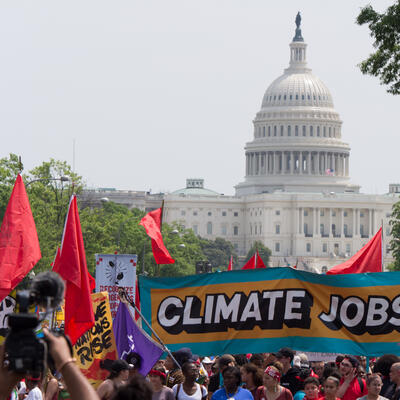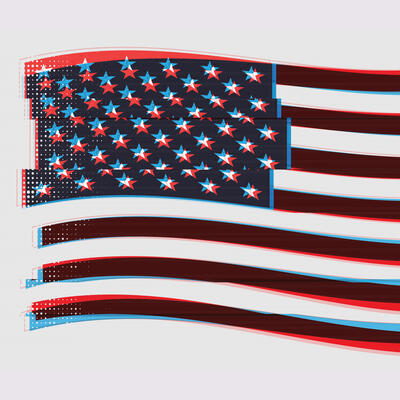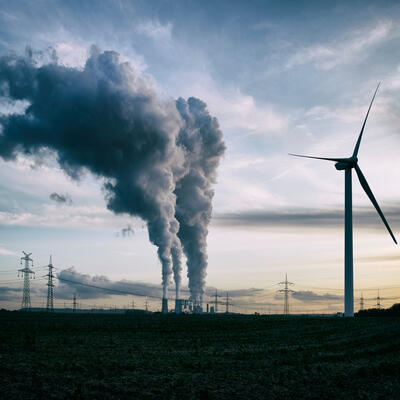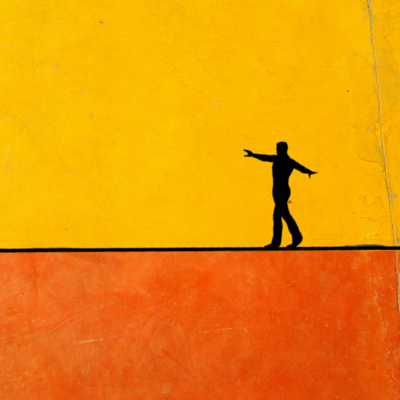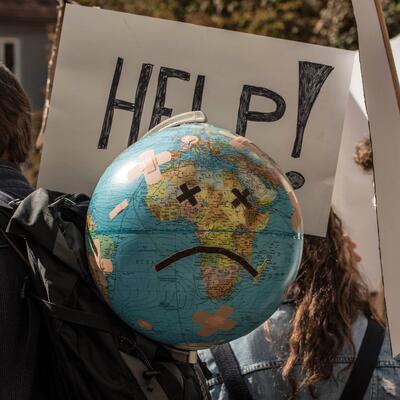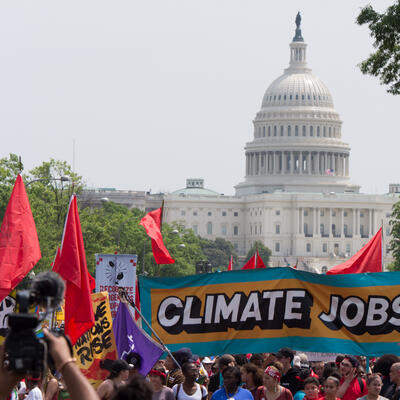
Climate & Democracy with Jamie Raskin, Heather McGhee and Rebecca Willis
Guests
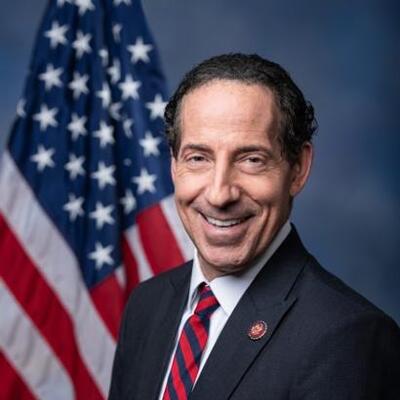
Jamie Raskin
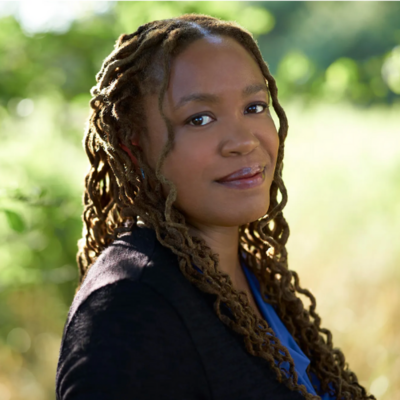
Heather McGhee
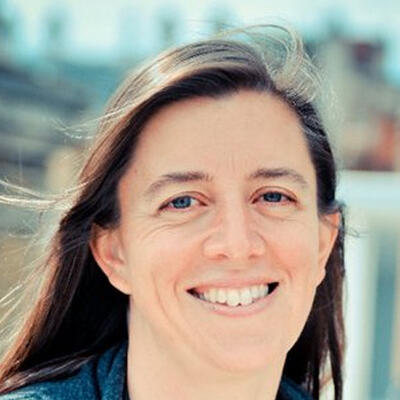
Rebecca Willis
Summary
As a member of the House Oversight and Reform Committee, Congressman Jamie Raskin has grilled fossil fuel executives on the industry’s long history of intentionally misleading the public. As a constitutional law professor, he’s offered deep insight into the connections between an informed citizenry and a robust democracy. Congressman Raskin was the lead manager for the second impeachment trial of the former president. Now, as Russia’s war against Ukraine continues, funded by its fossil fuel exports, we see clear ties between governance and climate action. Raskin says democratic governments around the world need to unite.
“All of the autocrats and dictators and kleptocrats of the world have found each other, grouped around the petro states and the exploitation of the earth and the destruction of our ecosystem by sticking to the old carbon model that's choking off the planet. And so the democratic movements and peoples and governments of the world have got to get together against the autocrats, like Putin in Russia and Orban in Hungary… to defend democratic institutions and democratic processes so that the vast majority interest of the people on earth can be vindicated in preserving democracy,” he says. “The struggle for democracy is the struggle for the truth and for science and to save us from climate disaster.”
In the US, we’ve become accustomed to climate – like nearly everything else – being politicized. Even when potential solutions might benefit everyone, a zero-sum mentality has taken hold, where there’s an “us” and a “them” and progress for them comes at the expense of us.
“When you can be divided and get easily manipulated into cheering the destruction of things that could be beneficial to part of the American people,” says political strategist Heather McGhee, “that's making life harder for everyone.”
McGhee is board chair of Color of Change, the nation's largest online racial justice organization, and author of the book, The Sum of Us: What Racism Costs Everyone and How We Can Prosper Together. In it she argues that racism in our politics and policymaking is distorting our ability to respond to big problems that require collective solutions by framing them as a so-called zero-sum game.
“The belief is that there's only so much to go around and what is good for an ‘other’ is bad for us,” she explains, noting that social science data show racial resentment is highly correlated with climate denialism and opposition to action on climate change.
But does it have to be this way? In the UK, for example, climate politics are rarely marked by the partisan and racial divides of the American climate debate.
“We still have a very consensual approach to climate change,” says Rebecca Willis, professor at Lancaster University and author of Too Hot to Handle? The Democratic Challenge of Climate Change. She notes that the UK’s 2008 Climate Act has endured across conservative and progressive governments. Willis sees both a promise and a warning in U.S. climate politics, as well as broader implications for global climate action.
“Maybe this is democracy’s moment,” she says. “Maybe this is the time that we see that we need collective action, because we sure as hell can't solve this one as individuals working through the market.”
This episode is part of ‘Climate & Democracy,’ a series from the global journalism collaboration Covering Climate Now.
Related Links:
The Sum of Us: What Racism Costs Everyone and How We Can Prosper Together
Too Hot to Handle? The Democratic Challenge of Climate Change
Full Transcript
Greg Dalton: This is Climate One. I’m Greg Dalton. Our climate and democratic systems are under threat.
Jamie Raskin: We have to save the democracy in order to save the climate and save our species.
Greg Dalton: For some people, progress on climate, like many other things, is a zero-sum game. In the United States, that belief is often racially tinged.
Heather McGhee: The belief is that there's only so much to go around and what is good for an “other” is bad for us.
Greg Dalton: And the zero-sum mentality can be hard to escape.
Rebecca Willis: The worst thing that can happen on climate is that we get into this false dichotomy of a healthy economy versus climate action.
Greg Dalton: Protecting Climate and Democracy, up next on Climate One.
Greg Dalton: This is Climate One, I’m Greg Dalton. As a member of the House Oversight and Reform Committee, Congressman Jamie Raskin has grilled fossil fuel executives on the industry’s long history of intentionally misleading the public. As a former constitutional law professor, he’s offered deep insight into the connections between an informed citizenry and a robust democracy. Congressman Raskin was the lead manager for the second impeachment trial of the former president. Now, as Russia’s war against Ukraine continues, funded by its fossil fuel exports, we see clear ties between governance and climate action. Raskin says democratic governments around the world need to unite.
Jamie Raskin: All of the autocrats and dictators and kleptocrats of the world have found each other, grouped around the petro states and the exploitation of the earth and the destruction of our ecosystem by sticking to the old carbon model, that's choking off the planet. And so the democratic movements and peoples and governments of the world have got to get together against the autocrats, like Putin in Russia and Orban in Hungary, and el-Sisi in Egypt and the homicidal crown prince of Saudi Arabia to defend democratic institutions and democratic processes so that the vast majority interest of the people on earth can be vindicated in preserving democracy. And then making the break from the carbon kings and the carbon dictators. The struggle for democracy is the struggle for the truth and for science and to save us from climate disaster.
Greg Dalton: Jamie Raskin’s son Tommy died by suicide in late 2020. Congressman Raskin has written about how that personal pain, combined with the January 6th violent attempt to overturn the presidential election, galvanized him to defend truth and democracy. I asked him how that has also affected his thinking about the climate emergency.
Jamie Raskin: I mean the young people are pretty panic stricken about climate change and what's taken place. And I know that from my own kids and their friends, and I know it from the young people that I meet every day. And my son, Tommy wanted a lot more from democracy and not a lot less from it. And had high hopes and expectations for what could be done. And he of course lost his life to depression. But, I think that for me, the struggle to defend the truth is a precondition for defending our democracy and the struggle to defend our democracy is a precondition for taking the effective action that needs to be taken in order to meet the climate crisis in a serious way and turn it around. And this should be a moment where democracy is secured and released and emancipated in every country on earth and the democratic peoples of the world get together to confront climate change.
Greg Dalton: Some people don't talk about climate change because they think it is depressing. It's seen as something of a difficult topic. How do you navigate that in your own life? Talking about it? Cause it's seen as a downer, sometimes or scary. People don't know what to do about it.
Jamie Raskin: You know, I think that that's been true of all of our great challenges. I mean, there was literally a rule in Congress that you couldn't mention the word slavery for decades. I mean, you could be thrown off of the floor for introducing a bill about slavery or mentioning it in debate. And there are people who don't like to talk about wars. There are people today, I've got colleagues who are lying about Vladimir Putin and his filthy bloody war of atrocities against the Ukrainian people, right now. We have people lying about what took place on January 6th. Donald Trump said that his mob confronted our officers with, uh, hugs and kisses and, uh, presents and flowers, uh, which was presumably how, uh, The 160 of them ended up, uh, injured, wounded hospitalized and with, um, you know, traumatic brain injuries and post-traumatic stress syndrome. So there's a lot of lying going on out there. There's a lot of propaganda. There's a lot of disinformation; that too turns people off. And I just tell people two things when they say that they're burning out or it's too overwhelming. And I say one that you're not on a solo journey here. We're all in this together. And so if you're feeling burned out and you need to take the weekend off, then take the weekend off and other people will stand in your place in the climate movement, in the movement to defend democracy. And then, when somebody else gets tired for the weekend. You'll be there for them. So it's a collective enterprise we're in, but the other thing is never forget that Vladimir Putin and Donald Trump and Steve Bannon and Cambridge Analytica set out in the 2016 election to depress the hell out of everybody and to demoralize everyone and also to activate every unstable person in the country, because at the same time that they were trying to depressing demoralize young people, they were out looking for people who fit what they called the devil's triad of psychopathy, narcissism, and Machiavellianism. In case that psychological profile sounds familiar to you, that basically was the sector of society that was empowered and uplifted during the Trump administration.
Greg Dalton: Yeah. They've weaponized those, uh, uh, behavioral science with those technological tools. We certainly saw white supremacy on January 6th. How is that connected to extraction and combustion of fossil fuel?
Jamie Raskin: I don't know that question is probably beyond my pay grade, and somebody may have written a PhD dissertation about that. I don't, I don't know the answer to that, but I'll say this look, all of us are implicated in the carbon economy and all of us have obviously used electricity that comes from carbon emitting sources. So it's not a question at this moment of assigning blame and guilt tripping people. This is a collective situation we're in as humanity. So we all take responsibility for the extent to which we've been part of it, or we've been indifferent to it. But all of that is basically irrelevant compared to the imperative of all of us getting together now to say that we need to make the political judgments and decisions necessary to break from the carbon economy and to invest in a safe, renewable energy economy around the world. That is the critical thing. I believe that white supremacy, authoritarianism, fascism, and antisemitism, misogyny, all of the monsters of the 20th century that the alt-right and Donald Trump and Vladimir Putin in their buddies have tried to unleash against us is an effort to distract us from what really needs to be done and obviously to maintain their own power and their own way of doing business. And so, in addition to being intrinsically dangerous to all of us and especially to people who are being targeted, like racial minorities, all of those hateful throwback ideologies to the, in the 20th century are a massive distraction from what we need to be working on. We're never going to be able to successfully deal with climate change If we're spending all of our time fighting the proud boys and the oath keepers and the KU Klux Klan and the Aryan nations and, uh, all of Steve Bannon's alt-right nonsense. So we need to defeat them, overcome them and move forward with the real project of rescuing our species from the problem of carbon emissions and, uh, the rising, uh, levels of CO2, um, in our atmosphere.
Greg Dalton: Fossil fuel and industrial agricultural interests have bipartisan support in Congress. And they're working in the courts to narrow the protective powers of the EPA and other executive agencies. What parts of the federal government are best empowered to take strong action on climate right now?
Jamie Raskin: Well, all of it comes back to Congress and we need to have a pro democracy Congress, which means the pro democracy party or if there are pro democracy, parties need to win against the authoritarian parties of insurrection, and coup reaction. So, It starts there, but you're right there, you know, the heart of the right wing effort. If you listen to Steve Bannon, is to dismantle the regulatory state, you know, what, what they call the deep state, which is just the regulatory institutions that Congress has built. The people who've built in order to control runaway oligarchs of our own. Uh, and that's. The regulations we have to enforce the clean air act, the clean water act, uh, the national labor relations act, the fair labor standards act. They want to wipe all of that out. So the American oligarchs will have the same kind of power that the Russian oligarchs have.
Greg Dalton: What's your take on President Biden's use of the defense production act to boost mining of minerals, essential to electric vehicle batteries, et cetera, as a constitutional scholar, who's thought a lot about balance of power, would you be concerned about a future president using that kind of, uh, executive power, uh, to, you know, support fossil fuels? And say there's an emergency there?
Jamie Raskin: Well look, presidents have power through the regulatory institutions, agencies, and departments to write rules that interpret statutory mandates. And so it's just a question of legal interpretation. Are they running afoul of their statutory authority? Are they acting ultra virus outside of their powers or are they not? But we are in, not just a nationwide, but a global emergency with respect to climate change. And I would hope that this president would take vigorous executive action within the law to do whatever he can to counter CO2 emissions and to try to put us on the path towards some environmental sustainability.
Greg Dalton: Right. And a lot of people look at the science and they look at government and markets and say, it's not happening fast enough. Decarbonisation is not happening fast enough. You've been talking with young people, passionate about moving to a cleaner economy. Some of those young people think about change outside of orderly, the political process. We've seen that on the right and there that's happened. That's brewing on the left. If climate does, if more climate action doesn't happen, are we going to see more disobedience on the left to make it happen?
Jamie Raskin: Well, I don't know about disobedience, but I certainly know there are tons of young people who are making changes in their living arrangements in their lifestyle. For example, lots and lots of young people are going vegan or vegetarian, understanding that 30% of greenhouse gas production comes from the livestock industry. It's enormously wasteful. It happens to be, uh, terribly inhumane. And we don't need to do it. It's like my son, Tommy used to say, in the age of Beyond sausage and Impossible burgers with the alternative protein, nobody needs to be depending on the slaughter of animals for a protein on their dinner plates. So I agree with you that the young people are taking direct action. The ones I know are not punching police officers in the face or hitting them over the head with baseball bats or American flags or Confederate battle flags, that's the right’s program. But our program is to make as much positive change as possible in our communities and our families and in our neighborhoods. And that's certainly the young people that I'm familiar with from democracy summer, which is the project we do now. We hope with more than a thousand young people coming this summer to learn about the history of political change in the country, and then what they can do to be involved at this pivotal moment in our history.
Greg Dalton: Right. And, and you speak about, you know, individual dietary choices that is certainly happening, uh, particularly about young people, but in the policy realm, climate is often thought about as an energy oil, gas, et cetera. You know, Cory Booker has a bill to try to get at industrial agriculture. Is there support for really tackling food as a climate issue in the House, where there's a lot of support for corn and ethanol and other things?
Jamie Raskin: Well, I think you're right, that there's a lot of education to be done. And a lot of consciousness to be raised about this point. I'm just becoming the co-chair of the alternative protein caucus to try to let people know it's not just beyond sausages and impossible burgers, but there's lots of new technologies that will allow us within the next ten years to perhaps make a complete break from animal agriculture, livestock, industrial style agriculture, with factory farms and so on. And as my son Tommy used to say, there was a time when people just thought slavery was normal and natural. And we would live with our people, thought witchcraft trials were normal and natural, and we evolved beyond it, uh, as a people. And we have the potential of evolving beyond the consumption of of animal meat.
Greg Dalton: Efforts to restrict voting rights are happening at the state and even precinct level. Most energy in this country runs through pipes and wires regulated at the state and local level. As a former state legislator yourself, is too much attention paid to visible national politics when so much of the action is at the less visible local level?
Jamie Raskin: Well, it's a great point. And this is something that's very much on my mind with respect to the work of the January 6 select committee, because you know, we're in danger of just fighting the last battle, the last war. I mean, nobody thinks that Kamala Harris is going to try to run away with the presidential election and Mike Pence didn't run away with the presidential election. The real battle today is in the states as the GOP wages a war of voter suppression against democracy. And they are trying to repeal early voting and weekend voting and mail-in balloting. They're making it, or they've made it a crime in Georgia to pass somebody a bottle of water. who's waiting in line to vote for four or five hours. They're doing everything in their power to make it more difficult for people to register, to vote. And then even then they don't have confidence. They can stop the commanding majority of the American people who oppose their assault on democracy. And so they're looking for ways to engage in election subversion so that even if they lose an election, appeals would go not to the traditional bipartisan election committees, um, election boards, but rather to partisan election boards were directly to the state legislature or directly to a council appointed by a governor. So they're doing everything they can to rewrite the rules of elections so they can't lose. And I'm sorry to say that my friends across the aisle have become, uh, a rule or ruin party. Their attitude is they're going to rule everything and they’re can kind of control everything, or they will ruin the prospects for democracy.
Greg Dalton: So my last question for you, congressmen is with a burning democracy and a burning climate. How do you as a person and we as a country hold and confront both emergencies in an integrated way?
Jamie Raskin: Well with a burning passion to defend our country and to defend the survival of our species. And I don't think that's hyperbole. I mean, if we had bigger brains, if we were smarter, as an animal humans would be working on nothing other than climate change at this point, but because of the, the Trumpist movement and the authoritarian thug, Vladimir Putin, and all of their allies around the world we’re dragged back into a basic struggle between constitutional democracy and human rights versus authoritarianism. And so the democratic governments and movements have got to win that struggle and move on to make the profound policy changes we need in order to defeat climate change next.
Greg Dalton: Thank you for your time, Congressman, thank you for sharing your insights.
Jamie Raskin: Thank you for having me.
Greg Dalton: Jamie Raskin is a Democratic Congressman from Maryland. This conversation is part of the ‘Climate & Democracy’ series from the global journalism collaboration Covering Climate Now. Coming up, how environmental racism ultimately hurts everyone living under the same sky.
Heather McGhee: The illusion that you can shunt all of the burdens of our polluting economy onto the current, kind of, wrong side of the environmental tracks -- it’s an illusion, it’s a lie.
Greg Dalton: That’s up next, when Climate One continues.
Greg Dalton: This is Climate One. I’m Greg Dalton. Here in the US, climate is just one of the many areas where a racially-tinged zero-sum mentality has distorted our democracy’s ability to respond in ways that could benefit everyone.
Heather McGhee: When you can be divided and get easily manipulated into cheering the destruction of things that could be beneficial to part of the American people, that's making life harder for everyone.
Greg Dalton: Heather McGhee is the board chair of Color of Change, the nation's largest online racial justice organization, and author of the book, The Sum of Us: What Racism Costs Everyone and How We Can Prosper Together. We spoke last year about the connections between a threatened democracy, systemic racism and a disrupted climate.
Heather McGhee: The issue of climate change certainly came sort of hurdling to the fore for me when I had my son. I remember the specific moment and I write about it that Some of Us when I was nursing him when he was a few weeks old. And I was scrolling, you know, with my free hand on my phone in the middle of the night and came across it was a Guardian article about the UN intergovernmental panel on climate change’s report saying that we had 12 years to act. You know, when you’re holding a four-week old, 12 years feels like nothing, you know. And I have not originally intended to include a chapter on the environment and climate in The Sum of Us but I was when I had my son, I was well on the journey to write the book and I was finding these ways in which racism was the sort of core element of our dysfunction. And I thought well, isn’t it possible that racism is driving this country to sabotage its own future by ignoring the perils of climate change. Isn’t it possible that that's connected too? And so, I started asking the questions and doing the research and it turned out that it was.
Greg Dalton: That was a very powerful moment in the book. I've long understood that a lot of the opposition to cap and trade and climate action was because Barack Obama proposed it. But I had a deepened understanding reading your book and how the politics of the last 10 years have seen rabid Republican opposition to the Affordable Care Act and moving to clean energy. And you write about how much of that is because of the messenger and his skin's color. What’s the evidence for that?
Heather McGhee: Well, this was the question, right, I first asked because the subject of The Sum of Us is what racism costs everyone. And then the flipside of that is how we need each other in order to prosper. And so, as I’m investigating all of these different ways across the American economy how racism in our politics and policymaking is distorting our ability to respond to big problems and to advance collective solutions, it became clear to me that there was something there with climate that was under the surface about race and identity. And so, you know, I dug deep into the social science data and a number of different scholars found that this phenomenon called racial resentment which just put simply, a sort of the idea that black people don't work hard enough and get too many special favors from the government was highly correlated with anti-climate change solution belief, right, with climate denialism with opposition to action on climate change. And for me that began to make a lot of sense because as I discovered in the book, one of the core routes that racial resentment travels in our politics is through the permission structure around government. So, the idea is the government used to be really on the side of white supremacy, right, the government was the segregator, was the enforcer of the racial hierarchy. And then in a very relatively brief period of time in the 1960s, suddenly, that changed. And so, that was a core betrayal for many white Americans and the resentment about that betrayal has been stoked. And that's the message that I like to make sure to center throughout whenever I'm talking about the Sum of Us is that this is about a self-interested elite that has used political narratives to drive and increase racial resentment, particularly in the Obama era. But the antigovernment fervor among the right which is much stronger among white men than it is among other Americans, you know, has a lot to do with racial identity. And the idea that the government sort of is for lazy black people, right. And the government and the idea of the public puts people in common space. And that is something that people don’t want if they distrust the people who are in the commons, right. And so, it's clear that the government has to do something and act in a very big way, right, to address climate change. And so, therefore that's the link right is that you resent the government you resent people of color. And then on top of that you get the biggest climate actions that have been proposed from Paris to cap and trade to the clean power plant to the EPA to the CAFE standards on vehicles were all by the first black president at a time when in fact often not related to actions he was taking, you had these coal industry jobs declining often because of just market forces and natural gas. And so, there was this very clear zero-sum right. It was like this black man is taking jobs away from white men. And that's the narrative that the Koch brothers advertising and sort of the Fox News kind of right-wing media infrastructure really, really blared out was that idea of a zero-sum. You know the future that this black man and his government want has no place for white men to be in their traditional positions.
Greg Dalton: I think you quote Rush Limbaugh who talked about their cap and trade bill as this is reparations, right. He actually said it and I think there’s another piece where you say that if Bill Clinton's face had been on Barack Obama's bill, it would've been a very different reaction.
Heather McGhee: I think you can't dig into the social science data, you can't look at all that data and not say that yes this is playing a huge role. Now the right-wing is very clear that they like to tarnish the entire Democratic Party with that same brush, right. They’d love to continue to stop progress on these issues even though Pres. Obama is no longer in office. But someone was talking about how at one of the big conservative conferences called CPAC, you know, they sell merchandise in the hallways. And it's like “lock her up” and, you know, all this kind of stuff that you wanna wear on your T-shirt, right. Because you’re like, yeah, it’s a big part of your identity. And the merchants still had anti-Obama T-shirts and hats and stuff and anti-Hillary T-shirts and hats. And they had anti-Biden stuff and it just wasn’t selling, right, it’s not the same like visceral this is a part of my identity to show who I'm opposed to and it’s, you know, an uppity woman and an uppity black person.
Greg Dalton: Some people when Barack Obama was elected said, you know there's gonna be hell to pay for this. That there's gonna be a reaction like there was for reconstruction. Did you expect such a backlash?
Heather McGhee: I did. I did. I think I didn't realize the degree to which it would infiltrate issues that weren't about race or that shouldn’t be about race, right. You know I think the president, Obama, thought that, you know, if he largely avoided race, he could do things that were in the broad public interest of the country like the Affordable Healthcare and Wall Street reform. And what he didn't realize is that the majority of white Americans would disapprove of the Affordable Care Act, and as they still do today right it's never reached 50% approval among white Americans because it is Obama care. Even though white Americans of the largest group of uninsured.
Greg Dalton: Right. And as you often say, no Democrat has won the majority of the white vote since Lyndon Johnson passed the Civil Rights Act and said lost the South for a generation. You write about zero-sum racial hierarchy in the American economy that was built on stolen land, stolen labor. Explain that zero-sum view and how white people and black people see it differently.
Heather McGhee: The zero-sum game is this idea that progress for -- that there’s an us and a them and that progress for them has to come at the expense of us. And you know, just to be clear from an economic standpoint, it's false, right. We actually, you know, they are multipliers of economic activity and participation. The more everybody on the team is on the field and able to score points the more the economy grows, right. We have Citigroup and McKenzie and the Federal Reserve Bank of San Francisco, all in the past year tabulating in the trillions the costs of our racial, economic divide. And yet the belief is that there's only so much to go around and what is good for an “other” is bad for us. And so, it then becomes easy for political elites who want to stop progress to paint anything as being good for your opposing team, right. And therefore, having people who nonetheless might benefit from whatever that benefit or a program or a reform is as losing out somehow. Now that is a view the way of seeing the world and particularly sort of race relations in America through that zero-sum lens is prevalent among white Americans and much less so among Americans of color. We simply don't believe that our progress has to come at white folks’ expense. And yet it really is that zero-sum which Sum of Us identifies as our major impediment to progress in this country and all the things we really need in life require collective action. And so, when you can be divided and get easily manipulated into cheering the destruction of things that could be beneficial to part of the American people. That's, you know, making life harder for everyone.
Greg Dalton: You write that there's more alignment among leaders in the climate field now than there has been in decades, in part because they had been forced to see, quote, "the damage of white supremacy both inside and outside their ranks." Can you explain more about that damage?
Heather McGhee: Yeah, I mean this is an issue that people who work in the climate field know much better than I am and I have enough friends in the field to have a little bit of a sense of the ways in which the vast majority of the resources in the professional climate and environmental infrastructure go to larger white-led, in terms of their boards and their leadership, organizations and that often organize mainly white communities. And the problem with that is that it doesn't actually reflect where the most natural and activated and concerned base is. According to the Yale Project on Climate Communication, there's a pretty significant gap in support and enthusiasm for climate change solutions and environmental regulations between white people and black and brown people. And that black and brown people are much more the alarmed and concerned --
Greg Dalton: Well, they’re breathing it and they’re closer to the sources. It’s more directly part of their life.
Heather McGhee: Exactly. Whereas, you know, many white folks are sort of dubious and you know that comes back to that kind of the zero-sum world view, the anti-government ethos, the anti-science ethos, which has come up. And so, that means that if you got these sort of big white led groups organizing and white communities and this natural base of people who want to be active underserved and under-resourced and you have all these wonderful environmental justice leaders across the country. Many of whom are just homegrown, you know, moms taking action and you know people who were cleaning up their own backyards in a larger sense, right, their own neighborhoods and taking on polluters but who are under-resourced, that’s a distortion. that’s not strategic, that’s not smart.
Greg Dalton: You write about white Americans turn their backs on unions which had built the middle class during the Golden Age of shared prosperity from the New Deal to the end of the 1960s and you came to understand the reason was racism. Looking at the energy economy, fossil fuel companies have a higher percentage of union labor than clean energy companies. How do you view that disparity?
Heather McGhee: Well, this is the fight, right. I mean, you know that is definitely something that labor activists and workers’ rights organizations and communities of color who are organizing to get those green jobs are very aware of. That often that these clean energy jobs are done by, you know, or run by exactly those kinds of coastal social liberals who are more from the low-cost labor gig economy orientation towards employment, right. So, these jobs are contract jobs, they are gig jobs they have, you know, no benefits, no labor protections. There has not been the same receptiveness whether it's Tesla, right, which is a massive company that has totally resisted unionization where there's, you know, a lot of reports of terrible labor conditions inside. And yet, of course, it's this you know, sort of darling of the coastal elite, right, because everyone loves their luxury electric vehicle, right. So, that's in many ways a microcosm of that tension, right, that you just sort of have like the nice new gadget and you’re sort of bragging about the solar panel on your roof to your neighbor with their $2 million house, you know, with ocean views, or are you saying, like I actually want everybody to be able to breathe. And that doesn't just mean that there's not wildfires; it means that people have enough money to meet their needs. 4 out of 10 workers, adult workers before the pandemic weren’t paid enough to meet their basic needs. For housing, utilities, transportation, food, right. Four out of 10. And yet we've had just since the pandemic began minted 60 more billionaires and had the existing billionaire class have an over $1.3 trillion gain in their net worth to the degree that they could have paid for two thirds of the American rescue plan with just their pandemic profits alone.
Greg Dalton: You talked about sacrifice zones for areas where the fossil fuel economy will kind of sacrifice Richmond or certain areas. That creates the perception that environmental racism doesn't affect white people. So, I’d like to just come back to that the idea. How does environmental racism hurt white people?
Heather McGhee: This is something that I do talk about in that chapter “the same sky.” While not at all diminishing the ways in which the greatest environmental harms are borne by families of color. And the greatest sort of political indifference to those harms, right, is seen when it comes to families of color. It's also true that the illusion that you can shunt all of the burdens of our polluting economy onto the current kind of wrong side of the environmental tracks as one of the professors that I spoke with for the book put it, is an illusion, it's a lie, right. We live under the same sky, and the way this works actually is that basically if often white decision-makers believe that they can be spared the burdens and the costs of pollution they won't demand that companies control the pollution and minimize the pollution. And that means there's more of it than there would be otherwise. And so, this is what an academic named Dr. Rachel Morello-Frosch found at Berkeley that in fact if you live in, if you’re a white person in a segregated community you have more carcinogenic pollutants in your air than if you're a white person in an integrated community.
Greg Dalton: So, integration’s good for your health.
Heather McGhee: Integration is good for your health. Anything that makes us believe that this zero-sum there can be profit on one side and loss on the other is going to distort our decision-making, right, it’s gonna make us less careful, less wise, right, less prudent. Because there's a solution that the cost can always be borne by some racialized other.
Greg Dalton: You are an empathic person. In 2016, I think the country got to see that when you were being interviewed on C-SPAN when Gary from North Carolina called in and asked you to help him with his prejudices and fears. When he said I am prejudiced, I saw you close your eyes and you seemed moved by his candor. That video went viral. I think it was viewed more than 10 million times. You became friends with Gary who later read books by Cornel West and others. That conversation changed Gary from North Carolina; how did it change you? Did it change your ideas of a racist white man from North Carolina?
Heather McGhee: Yes and no. No, in the sense that I, you know, I had never fallen for the idea that there is just like bad racist people and good nonracist people, right. They never made any sense to me, right, it didn’t add up, right. It didn’t add up that just, you know, when my mother was born in 1950 that the country was just full of evil white people, right. And, you know, it was just like, well, that’s a little easy right for us to say, you know. So, I always had a fair amount of understanding that racist ideas are profitable for powerful people to sell to white people, right. And that there are some people who are desperate enough to buy those ideas and that it's the people who are selling those ideas that we have to hold accountable because they're doing it for their own profit. So, I was changed by knowing Gary, I have been changed by knowing Gary because it's just been the sort of really fascinating real-time example of sort of the a rural middle-aged pre-isolated white man, you know, and the sort of shifts in his consciousness that have happened over the during the Trump era, particularly. But I mean I think the reason why I responded the way I did is because I didn’t come in, you know, I have a fair amount of pity for people who believe the lies of racism.
Greg Dalton: Yeah, there’s hurt underneath that anger. And as we end here, I’d like to ask how a person listening to this conversation can become a white ally concerning the issues we've been talking about.
Heather McGhee: So, folks can join Color of Change, it’s the organization that I volunteer for in a board capacity which is the largest online racial justice organization. As well as for folks who are really focused on climate there is a coalition called the Climate Justice Alliance and that's the big umbrella group of environmental justice organizations. All of those are ways you can take action to fight for a better future for all of us living under the same sky.
Greg Dalton: Well, Heather McGhee, it’s been a pleasure to spend time with you. Thank you very much for coming on Climate One. Thanks for your book.
Heather McGhee: Thank you.
Greg Dalton: You’re listening to Climate One. Coming up, what American democracy could learn from climate politics abroad.
Rebecca Willis: Maybe this is democracy’s moment, maybe this is the time that we see that we need collective action because we sure as hell can't solve this one as individuals working through the market.
Greg Dalton: That’s up next, when Climate One continues.
Greg Dalton: This is Climate One. I’m Greg Dalton. The United Kingdom is in many ways the United States’ closest political relative. Yet climate politics in the UK are rarely marked by the partisan and racial divides of the American climate debate.
Rebecca Willis: It’s funny looking across the Atlantic because I see a promise and a warning all at once.
Greg Dalton: Rebecca Willis is a Professor at Lancaster University in Britain, and author of Too Hot to Handle? The Democratic Challenge of Climate Change. We spoke last year before Russia’s invasion of Ukraine. She describes the passage of the UK’s 2008 Climate Act as an incredible political moment.
Rebecca Willis: It was the first time that any country anywhere had passed such comprehensive legislation to tackle climate change as a systemic issue. And the amazing thing about it was that it had a cross-party political support. So, all the major political parties in the UK supported it. And out of more than 600 members of the national parliament less than 10 I think it was three or five voted against it. So, it was incredibly consensual. And it basically set the tone for climate politics in the UK. So, we still have a very consensual approach to climate change. We don't have anything like the politicization of climate change that you have in the US or that you see in Australia.
Greg Dalton: Right. So, at that point the labor government supported it. The leader of the conservative party, David Cameron supported it. The US had kind of a political consensus around climate change at that time with Barack Obama and John McCain basically in the same place and that fell apart. So, in the UK in 2019 the British national policy was strengthened. What happened then?
Rebecca Willis: You’re right. The original Act was passed by a labour government, the left-wing government. And then in 2019 it was basically updated to reflect what we now know about climate science that basically we need to get to net zero greenhouse gas emissions by 2050. And so, the Act was updated to include that science. So, what has endured is the scientific consensus on climate change being translated into political consensus when the science changed, the politics changed. And in 2019, of course, that was under a conservative administration so, a right-wing administration, you know, continued the work of their political opponents really.
Greg Dalton: How does the conservative party in America, the Republicans, compare to conservative parties in other countries and their stance on climate? Is climate just an anathema to right-wing parties and democracies around the world?
Rebecca Willis: Well, I think this is an open question at the moment. What we've seen in the UK is a sort of soft support for climate policy on the right. So, we've seen strong support for the targets in the ambition but what we haven't seen in the UK is a really comprehensive narrative, a story of how a right-wing government or a center-right government can tackle climate change. And I think that's gonna be the next big challenge because what we’ve seen definitely in the US and to an extent in the UK is the left owning the story about how you tackle climate change, and tying that story strongly to related stories around social justice and racial justice as well in the US. In the UK, I would say the left has been louder about climate than the right. But you don't have that confident narrative and I think that’s what to play for. I think it’s perfectly possible to construct a right-wing climate narrative, it just hasn't happened yet. And it has to happen, right, because half the population of our country tends to vote right-wing and we need at least some of them to come with us. We can't do this just through left-wing votes. And so, articulating the climate case on the right is really, really important.
Greg Dalton: In Too Hot to Handle you reference the hidden rules that govern the British Parliament and how white men "assume their way of being a politician is the natural or neutral way of going about things." How does race play into the response of democracies to climate disruption in the UK or elsewhere?
Rebecca Willis: I did this research with members of the national parliament in the UK. I did anonymous interviews with politicians from all the major parties. And what it showed to me is that politicians really care about how they are perceived, how other people see them, and they developed this sort of strong sense of what a politician should do, how they should be presented. And there was some previous research about how black or minority ethnic and they struggled because they were constantly having to -- they were always being asked the race question. They were always being asked to say what they thought about race issues in a way that white politicians weren't being asked, right. So, they were singled out for being a minority as a racial minority or as a woman because there are still few female politicians. They were always asked about racial issues or about gender issues. What really surprised me when I did this research was that climate was also sort of an issue that politicians felt like outsiders if they stood up for climate action.
Greg Dalton: It’s not a white masculine issue?
Rebecca Willis: Well, it’s not part of political traditions. And so, a politician who decides to stand up for climate action who tries to make a case about why we need to shift the basis of our economy shift the basis of our politics to deal with this literally planet threatening issue. If a politician decides to stand up for climate, they are pitching themselves as an outsider. You know, the politicians who I spoke to said quite strongly that they didn't want to be seen as freaks for speaking out on climate. They didn't want to be seen as climate change zealots. Those were their words not mine. So, there was really strong language about speaking out on climate change. And you felt that politicians were sort of self-editing that they were really worried about climate, but also worried about speaking out they were worried about their reputation, about the sort of threat to their identity if they talk too much about climate.
Greg Dalton: One member of Parliament told you they've knocked on thousands of doors and people just don't talk about climate change. Research suggests that if people don't think they can affect the problem they are less likely to recognize its existence. So, does that pose a challenge for democracies that rely on public awareness to support for transformative change. If people aren’t talking about it the politicians don’t think it's important.
Rebecca Willis: Yeah, I mean the relationship between politicians and the people they represent is that’s the very fundamentals of politics, right. That's what politics is about. And climate is a really tricky issue when the politician’s thinking about who they represent. And they look to the public and they look to public opinion and they think that people aren't very concerned about climate because people don't talk to politicians about climate change. But actually, I've come to think of this is as a bit of a vicious circle. It's kind of a circle of denial. Because what’s actually happening is that people are worried about climate change, you know, both sides concerned about climate change is really strong. And yet, people don't see their politicians standing up and talking about it. And so, you have this sort of silent standoff where politicians are saying I don’t want to speak out about climate change because I'm not sure I'll be supported for doing that. I'm not sure I’ll get votes because of it. And on the other hand, you have people thinking well, I am worried about climate change, but if it was that serious surely politicians would be leading on this, right. Surely, they would tell us what to do. So, you have this sort of standoff where neither side is willing to make the first move, they’re both expecting the others to lead the way. And that's why I think that it’s really crucial that we get politicians who are brave enough to just stand up and say you know what climate this is the issue for politics.
Greg Dalton: I spoke earlier in this episode with Heather McGhee who argues that a major impediment to political support for climate solutions in the United States is the idea of a zero-sum game, that if something is good for you in this case, reversing climate injustice. It must be bad for us and that actually people of color and white Americans look at this differently that white people send to see a zero-sum and people of color, not so much. How do you see that dynamic playing out in the UK or elsewhere?
Rebecca Willis: The worst thing that can happen on climate is that we get into this false dichotomy of you know a healthy economy versus climate action. So, to give you an example. I live in the northwest of England where there is currently a proposal for a new coal mine. And this mine is for coking coal for steelmaking. And it has turned into this debate about jobs versus climate, right. Because this mine is offering 500 jobs in a place that desperately needs jobs. It's pretty clear from all the evidence that opening coal mines is completely incompatible with the climate goals we need to meet, right. We can't meet the Paris agreement and open new coal mines. That isn’t a political opinion, that’s scientific fact, right. And so, the community should never get to the stage where this coal mine was being offered to them. But it’s ended up in the situation where it’s seen as jobs versus the climate. And what really needs to happen and this is where we absolutely have to go next with the climate debate is that the only jobs on the table are green jobs, right. We should be confident enough about our climate story about our climate strategy the direction that our economy and our politics is going. That every single job offered to people in the north west of England is a climate compatible job. And yet what we've seen is not enough confidence. We've seen governments that have doing a bit of one thing a bit of another, you know, it's saying that we need to cut carbon emissions but agreeing to new mines new roads new airports is not really sure what it's doing about this. And that's actually hurting jobs that’s actually hurting the economy. And if it could set out a more coherent and confident plan, then that would be in the economic as well as the climate security interest of the country.
Greg Dalton: So what I hear there is that sort of zero-sum that I win you lose and sort of, you know, jobs or climate that those are sort of false choices that manifests in different ways, and we have to kind of look at and rather than those false choices. What do you see when you look at American democracy now and how it's addressing climate disruption?
Rebecca Willis: It is funny looking across the Atlantic because I see a promise and a warning all at once. The warning is that we shouldn't take our consensus here for granted, that it is an incredible thing that we've managed to have a consensus for now more than a decade. And if you look at countries like the US and Australia you can see how climate becomes a political football and that's really problematic. But there’s also a promise. And the promise for me is that what is starting to happen now in the US is a really confident political narrative around climate emerging from the Biden administration. And from the wider Democratic Party, it's a confident story about what the country looks like what it can look like and how you can achieve your aims as a political party and as a country while also tackling climate change. And that's really encouraging for me because the downside of the political consensus in the UK has been that we've all agreed that it’s a serious thing that we need to do something about, but we don't really have those debates about it. We don't test it. We don't argue about it. There isn’t really a proper political conversation about the very real social and economic changes that are needed. And I think instead we sort of try to tackle climate change through the back door through stealth. We haven't been open about those changes and the opportunities that they bring. And so, that's the promise for me of what we see in the US that you know it’s an open and lively political discussion.
Greg Dalton: It’s so strange to hear you say that because I think a lot of people here would say we like to have less politicization of the climate debate. It's been too politicized that where someone stands on climate change is highly correlated with their political identity and affiliation. And so, it's interesting to hear say that it’s -- I’m looking to this as a model.
Rebecca Willis: Maybe there’s a sweet spot, right, somewhere in the middle of the Atlantic is the sweet spot for climate politics. Ideally what I would love to see is absolute consensus on the goal, right. We have to get to net zero greenhouse gas emissions by midcentury, that's nonnegotiable as far as I'm concerned. The alternatives to that are just too horrible to contemplate. So, we have to have political consensus about the goal. But about the means of how we get there about the different policies and strategies whether we do it all through public spending. Whether we do it through taxing and carbon pricing, how that relates to social policy and so on, that is surely the stuff of political discussion and there should be a difference between left and right about that. So, I would really like a good argument about how we meet the climate targets. Where it gets problematic in the US is that you know not all but a significant number of Republicans don't even accept the target, right. That's the problem, that they don't agree that we need to be doing something about climate change.
Greg Dalton: We know that democracy flourish when economies grow in a relatively stable for a couple hundred years fossil fuels have driven that growth. How do you see the changing relationship between democracy, stability and fossil fuels?
Rebecca Willis: Yeah, I mean there’s some amazing work by the political theorist, Timothy Mitchell, who essentially says that what we are living at the moment is fossil based democracy effectively. That the fossil fuel economy gives us the kind of abundance and choice that allows democracies to function. And that if we move away from a fossil-based economy that means a completely different form of politics. And I think he's right to a certain extent, but I don't react to that with a kind of pessimistic therefore democracies doomed type, that's not my reaction. My reaction is instead that of course democracy will change because of climate change, but it can change for the better. One of the outcomes for the pandemic is actually a realization that we can't get through this as individuals right we need a state we need people to make decisions on the half things like you know things like lockdowns and vaccines, and all the responses to the COVID pandemic. They all require a strong and forward-looking state. And the same is true of climate. So, you know, maybe this is democracy’s moment, maybe this is the time that we see that we need collective action because we sure as hell can't solve this one as individuals working through the market.
Greg Dalton: Rebecca Willis is author of Too Hot to Handle? The Democratic Challenge of Climate Change, a professor at Lancaster University in the United Kingdom. Climate One’s empowering conversations connect all aspects of the climate emergency. Talking about climate can be hard-- but it’s critical to address the transitions we need to make in all parts of society. Please help us get people talking more about climate by giving us a rating or review if you are listening on Apple. You can do it right now on your device. You can also help by sending a link to this episode to a friend. By sharing you can help people have their own deeper climate conversations and it helps more people find our shows. Brad Marshland is our senior producer; our producers and audio editors are Ariana Brocious and Austin Colón. Our team also includes Arnav Gupta, Steve Fox and Tyler Reed. Our theme music was composed by George Young (and arranged by Matt Willcox). Gloria Duffy is CEO of The Commonwealth Club of California, the nonprofit and nonpartisan forum where our program originates. I’m Greg Dalton.
